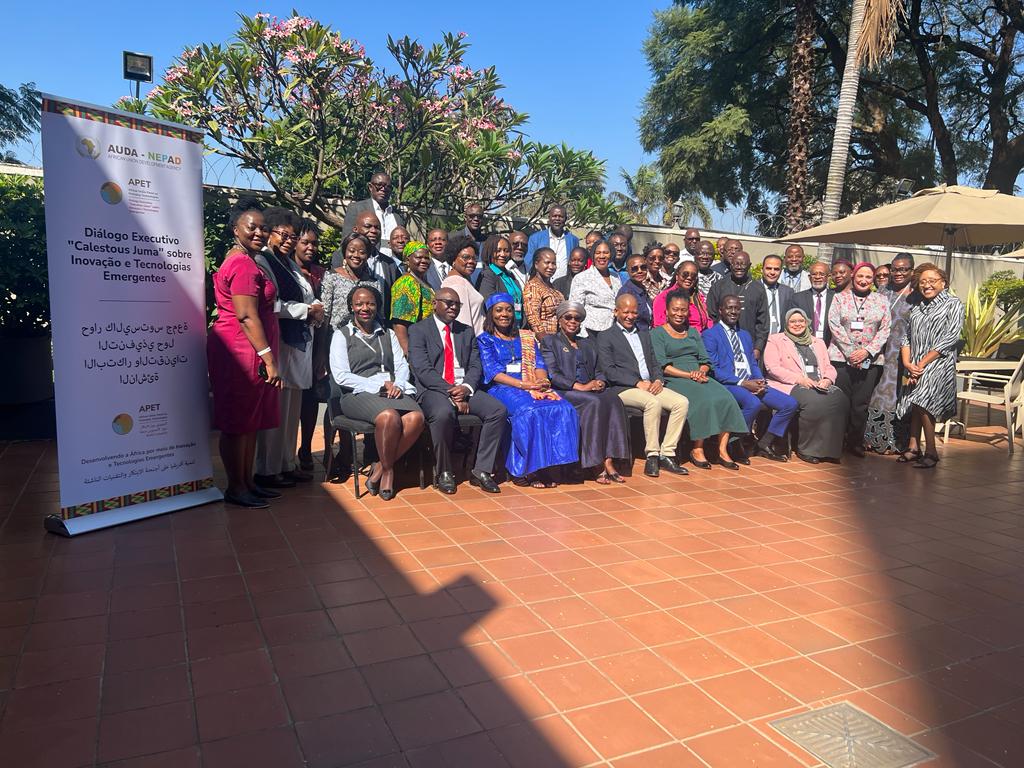|
Getting your Trinity Audio player ready...
|
The African Union Development Agency (AUDA-NEPAD) and the AU High-Level Panel on Emerging Technologies (APET) are working on accelerating the African Continental Free Trade Area (AfCFTA) implementation with emerging technologies.
This emerged at the 8th Calestous Juma Executive Dialogue (CJED) that took place in Harare, Zimbabwe, from 17th – 19th May under the theme, “Harnessing Emerging Technologies for Accelerated African Continental Free Trade Area (AfCFTA) Implementation and Industrialisation in Africa.” The theme was selected in alignment with the African Union’s theme for 2023, “The Year of AfCFTA: Acceleration of the African Continental Free Trade Area Implementation”.
The CJED brought together executives, policymakers, and decision-makers to discuss the integration of emerging technologies with various development sub-sectors. The 8th CJED convened government representatives, executives, youth, and other significant stakeholders to exchange knowledge and national experiences on how to leverage emerging technologies to accelerate the implementation of AfCFTA.
“As the world’s largest free trade area, AfCFTA presents a unique opportunity for the continent to unlock economic growth and development. The 8th CJED seeks to drive this growth by exploring how emerging technologies can be adopted to accelerate AfCFTA implementation and industrialisation in Africa,” said Prof Yaye Kene Gassama, Chair of the African Union High-Level Panel on Emerging Technologies and Professor in Plant Biotechnology at the University Cheikh Anta Diop de, who was the Guest of Honour at the Conference.
His sentiments were echoed by Mr Gaokgakala Daniel Lemmenyane, the Scientific Advisor to the Chairperson of the African Union Commission (AUC) who is based in Ethiopia.
“Trade is crucial for Africa’s economic growth, job creation, poverty reduction, and promoting understanding between cultures. APET launched knowledge products that are becoming a resource for African countries to raise awareness of the importance of emerging technologies for socio-economic development in Africa, including how artificial intelligence (AI) can address Africa’s development challenges.
“It was recommended that each African country should create a national AI strategy that outlines its goals for AI development and regulation. The strategy should be based on a careful assessment of the potential benefits and risks of AI, as well as Africa’s specific needs and priorities,” Mr. Lemmenyane said.
In a keynote address titled “African Economic Integration: Exploring Historic Perspective of Trade in Africa”, Prof Samuel Atintono, a distinguished scholar and educator, shared that AfCFTA has its roots in the pre-colonial era when African peoples traded goods and services with each other and with people from other continents.
“European colonisation disrupted this traditional trade and led to a decline in intra-African trade and reliance on trade with Europe. AfCFTA is expected to have a significant impact on the African economy, including boosting intra-African trade by $35 billion per year and creating 30 million jobs,” Prof Atintono said.
The workshop recommended that Africa needs to take ownership of its resources and people to know what it has and get
more of its resources; as well as strengthen its capability to innovate to share high-value goods and services. This can be done by investing in infrastructure and skills.
During the 3-day event, participants engaged in interactive sessions centred around five key modules:
- Digital Integration for Sustainable Trade in Africa
This module aims to identify the challenges and opportunities of digital integration for sustainable trade in Africa. It will explore strategies to maximise the benefits of digital technologies for AfCFTA implementation and industrialisation in Africa.
- AfCFTA’s Impact on Industrialisation, Manufacturing, and SME Development
Successful implementation of AfCFTA is expected to double Africa’s manufacturing sector and increase annual output to $1 trillion by 2025, creating over 14 million jobs. Aligning national efforts with Agenda 2063 is crucial for successful AfCFTA implementation.
- Enhancing Education and Skills Development in Africa: Integrating AfCFTA and Emerging Technologies
This module will explore how emerging technologies can be integrated into education and skills development programmes in Africa, especially in TVET training. Its objective is to discuss how the education sector can prepare the African workforce to take advantage of the opportunities that AfCFTA offers.
- The Role of AfCFTA in Expanding Access to Medical Products
This module will explore how AfCFTA can enhance health equity in Africa by expanding access to medical products. The session will discuss the challenges and opportunities of utilising AfCFTA to expand access to medical products and highlight strategies to ensure that the health sector benefits from the trade agreement.
- Driving African Economic Growth: The Role of the Private Sector in AfCFTA
The private sector has a pivotal role to play in driving trade reform and accelerating the implementation of AfCFTA. This module will explore how emerging technologies can address impediments to the acceleration of the AfCFTA, such as facilitating cross-border trade, addressing non-tariff barriers, and harmonising policies and regulations that will transform the continent.
“We are delighted to host the 8th CJED on a topic as crucial as the implementation of AfCFTA utilising emerging technologies,” said Dr Justina Dugbazah, the Coordinator of the APET-CJED programme and Senior Programme Officer of Education and Social Development at AUDA-NEPAD.
“The CJED has consistently served as a unique platform for convening key stakeholders to address critical development issues facing Africa, and we are confident that this year’s dialogue will provide valuable insights and solutions for leveraging emerging technologies to accelerate AfCFTA implementation and industrialisation in Africa.”






